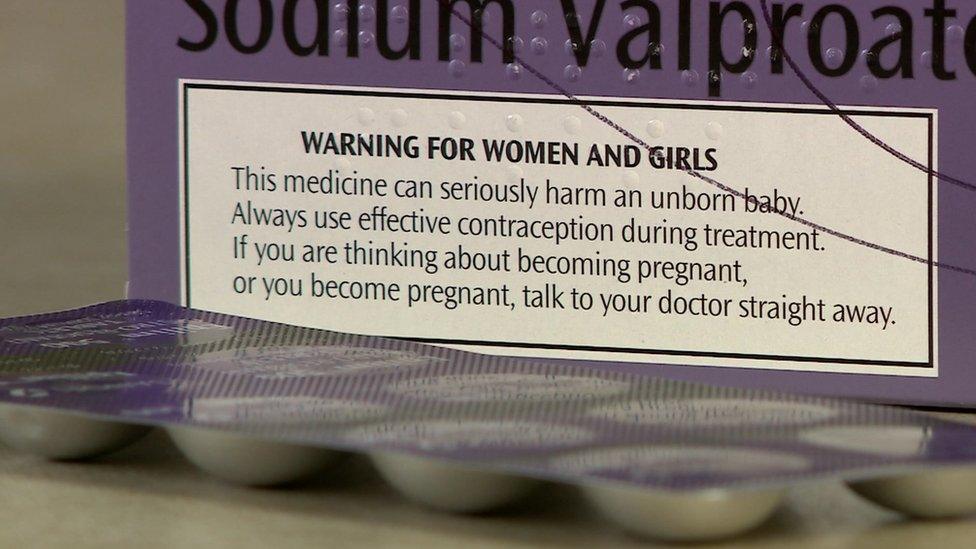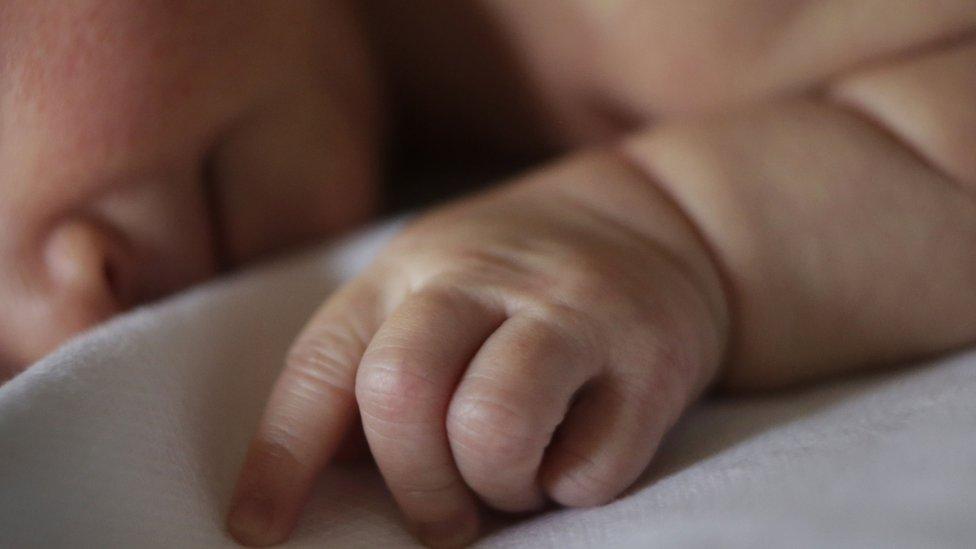Epilepsy drug's safety reviewed over pregnancy risk
- Published

The warning has been on the outside of valproate pill packets since last year in Britain
Women whose children have been harmed by the epilepsy drug sodium valproate will give evidence to a European-wide safety review in London next week.
The European Medicines Agency will examine whether warnings about risks to unborn babies are strong enough.
About 20,000 babies in the UK alone have been left with disabilities since valproate was introduced in the 1970s.
The medicines regulator said warnings had been updated as more information had become available.
Many women whose babies were affected say nobody warned them of the extent of the dangers.
Valproate is an effective treatment for epilepsy, bipolar disorders and migraine - and doctors prescribe it because it is the best option for some women.
Instructions for doctors - and, more recently, patient leaflets - say valproate should not be used during pregnancy unless there is no safer alternative and only after a careful discussion of the risks.
Babies exposed to valproate medicines in the womb have a 10% chance of developing physical abnormalities.
And they have a four in 10 chance of developing cognitive problems, such as learning disabilities and autism.
Three of Julie Marjot's children have been affected by sodium valproate
Julie Marjot, from Norfolk, says it wasn't until her last child was born that she was told the pills she took had harmed three of her four children.
"As time went by and we had more children, we saw more paediatricians, we saw GPs, we saw midwives, we saw all of these healthcare professionals.
"Why did it take for me to have four children before somebody finally said, 'That child looks like it has got sodium valproate syndrome,'?"
Her seven-year-old daughter, 11-year-old son and 21-year-old daughter have all been affected.
Scientific papers as early as the 1980s suggested valproate medicines were dangerous to developing babies.
More evidence emerged throughout the 1990s.
In 2005, UK patient information leaflets included concerns about delayed development in children.
Last year, warnings were also added to the outside of valproate pill packets in Britain.
'Constant review'
Medicines watchdog the MHRA said: "It is important women don't stop taking valproate without first discussing it with their doctor.
"The decision to use any medicine in pregnancy requires a careful evaluation of the benefits and risks to both the woman and to her unborn child.
"When considering the known risks of valproate, it is important to remember that untreated epilepsy and bipolar disorder can also carry serious risks.
"As with all medicines, the safety of valproate in pregnancy has been kept under constant review, and as new data have become available, the warnings have been updated."
In France, 1,200 families are preparing to sue the drug manufacturer Sanofi, accusing it of failing to sufficiently inform women of the risks.
The French government is supporting the legal action and has put aside about £9m (€10m) to compensate the families.
In 2010, families in England and Wales had to abandon a court case when their legal aid was withdrawn three weeks before the case was due to begin.
They signed letters promising never to sue again, and in return were not billed for Sanofi's multi-million pound legal costs.
They are now calling for a judge-led public enquiry.
'Real dilemma'
A statement from Sanofi said it was "deeply touched by the distress of those who are so affected".
The company said it would review the data on the risk-minimisation measures currently in place.
"Sanofi will reinforce the fact that sodium valproate is an important molecule that epileptic women continue to rely on, even today, to control seizures, to avoid a potentially fatal seizure during their lifetime, including during pregnancy."
It said doctors needed a range of therapeutic options to help women with epilepsy through pregnancy.
"It is critical that both the risks of continuing treatment and the risks of stopping treatment are discussed before planning a pregnancy, bearing in mind that other medications also have risks.
"It should be acknowledged that there is a real dilemma faced by physicians and women who have no other alternatives to control their seizure.
"Everyone in the healthcare system has a role to ensure that the risks as well as the benefits of valproate are understood."
- Published20 April 2017
